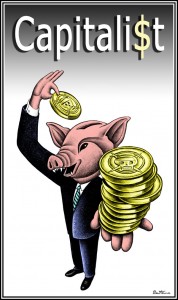
The conventional wisdom, to this point, has been that current economic crisis cannot be as bad as The Great Depression. Conventional wisdom is apparently changing.
Last week, renowned investor George Soros said the world financial system has effectively disintegrated, adding that there is yet no prospect of a near-term resolution to the crisis.
Soros believes the current economic crisis has created more severe turbulence than the Great Depression and former Fed chairman Paul Volker, speaking at the same conference at Columbia University, agrees: “I don’t remember any time, maybe even in the Great Depression, when things went down quite so fast, quite so uniformly around the world,” Volcker said.
Referring to events in Septmeber 2008, when Lehman Brothers went under, Soros said, “We witnessed the collapse of the financial system. It was placed on life support, and it’s still on life support. There’s no sign that we are anywhere near a bottom.”
The bailout money is being abused in a number of ways, all of which recycle bailout cash back to corporate elites and the political class:
- Former New York Governor Eliot Spitzer has criticize AIG, not for using bailout cash to give huge bonuses to its executives, but for repaying, in full, its investment banking partners—steering additional federal dollars to Goldman Sachs, Bank of America, Merrill Lynch, JPMorgan Chase and others when they already were already being propped up by Washington.
“Bank of America (which got $15 billion in bailout money) sent out $24,500 in the first two months of 2009, including $1,500 to House Majority Leader Steny Hoyer and another $15,000 to members of the House and Senate banking panels. Citigroup ($25 billion) dished out $29,620, including $2,500 to House GOP Whip Eric Cantor, who also got $10,000 from UBS which, while not a TARP recipient, got $5 billion in bailout funds as an AIG “counterparty.”
But Spitzer and Newsweek are talking small potatoes compared to the Simon Johnson’s assessment of the current economic crisis. In “The Quite Coup” (The Atlantic, March 2009), Johnson, a professor at MIT’s Sloan School of Management and former chief economist at the International Monetary Fund, says that that the finance industry has “effectively captured our government” not through violence or bribes (Abramoff and K Street notwithstanding), but
Instead, the American financial industry gained political power by amassing a kind of cultural capital—a belief system. Once, perhaps, what was good for General Motors was good for the country. Over the past decade, the attitude took hold that what was good for Wall Street was good for the country. The banking-and-securities industry has become one of the top contributors to political campaigns, but at the peak of its influence, it did not have to buy favors the way, for example, the tobacco companies or military contractors might have to. Instead, it benefited from the fact that Washington insiders already believed that large financial institutions and free-flowing capital markets were crucial to America’s position in the world.
What we have is an ideological coup. The government quite clearly acting as the executive committee of the rich. Johnson explains why we have been been denied the pleasure of of seeing fat cats jumping out of Wall Street skyscrapers—the financial oligarchy remains in control, blocking essential reforms and continuing to push us toward the Greatest Depression.
Johnson’s article is the most clearly reasoned, knowledgeable, and accessible piece I’ve read on root causes of the current crisis and he presents a “tried and true” strategy for solving it too—IMF shock therapy. He likens the U.S. economic and financial crisis to what has been seen in emerging markets (and only in emerging markets) like South Korea (1997), Malaysia (1998), Russia and Argentina (time and again).
In each of those cases, global investors, afraid that the country or its financial sector wouldn’t be able to pay off mountainous debt, suddenly stopped lending. And in each case, that fear became self-fulfilling, as banks that couldn’t roll over their debt did, in fact, become unable to pay. This is precisely what drove Lehman Brothers into bankruptcy on September 15, causing all sources of funding to the U.S. financial sector to dry up overnight. Just as in emerging-market crises, the weakness in the banking system has quickly rippled out into the rest of the economy, causing a severe economic contraction and hardship for millions of people.
The financiers who created the crisis with the able assistance of Wall Street alumni in government (particularly ex-Goldman Sachs executives who have been ensconced at the Treasury Department for multiple administrations) are now, according to Johnson, “using their influence to prevent precisely the sorts of reforms that are needed, and fast, to pull the economy out of its nosedive. The government seems helpless, or unwilling, to act against them.” Well, the financiers are the government.
For Johnson the two major, interrelated problems are the banking sector “that threatens to choke off any incipient recovery that the fiscal stimulus might generate” and “a political balance of power that gives the financial sector a veto over public policy, even as that sector loses popular support.” On the former, he suggests the IMF’s nationalization approach. On the latter, Johnson suggests replacing our current elites, with a new batch. Hmm.
While Johnson’s analysis is compelling, his solutions, unsurprisingly, aren’t—two scenarios: IMF approach solves the problem or catastrophic global depression smartens up the elites).
Meanwhile the US government moves forward to on plans to use the military to control civil unrest as a result of the collapsing economy, as legislation to establish internment camps on US military bases has been introduced into the House of Representatives.
Doesn’t look to me like the finance oligarchy is planning to step down any time soon.
